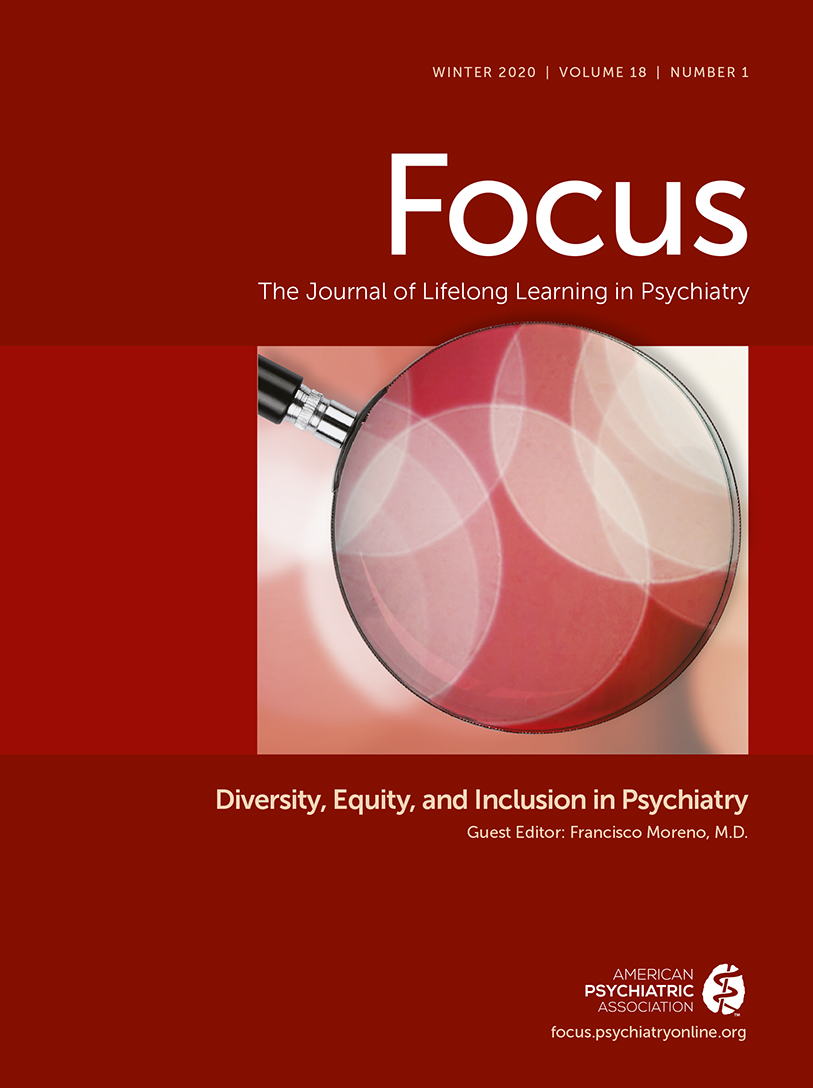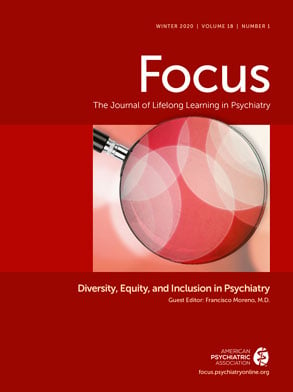(Excerpted from “The American Psychiatric Association Practice Guidelines for the Psychiatric Evaluation of Adults, Third Edition.” Copyright © 2016, American Psychiatric Association. Reprinted with permission.)
Rationale
The goal of this guideline is to improve, during an initial psychiatric evaluation, identification of cultural factors that could influence the therapeutic alliance, promote diagnostic accuracy, and enable appropriate treatment planning.
The strength of research evidence supporting this guideline is low. Despite this, there is consensus by experts that the benefits of including the assessments described in statements 1 and 2 in an initial psychiatric evaluation clearly outweigh the potential harms.
Individuals present for psychiatric assessment with a wide range of backgrounds, cultures, and beliefs. Data from the American Community Survey (
U.S. Census Bureau 2012) show that the U.S. population is extremely diverse in its ancestry and racial and ethnic characteristics. About 13% of persons living in the United States were born in a different country, with about one-half of these individuals born in Latin America and about a one-quarter in Asia. Approximately one-fifth of the U.S. population, about 60 million individuals, speak a language other than English in their home. Of these individuals, slightly more than one-half also speak English very well. Nevertheless, increasing numbers of individuals in the United States have limited proficiency in English, which can affect their receipt of appropriate health care.
No study has specifically examined whether health outcomes are improved when an initial psychiatric evaluation includes assessment of the patient’s language needs and culture. Available studies do suggest, however, that discordance between the patient’s and the clinician’s language or limitations in English proficiency challenge health-related communication, reduce diagnostic reliability, decrease the effectiveness of care, and heighten the risks of treatment in psychiatric (
Bauer and Alegría 2010;
Bauer et al. 2010;
Kim et al. 2011;
Leng et al. 2010) and nonpsychiatric (
Fernandez et al. 2011; Wilson et al. 2005) settings. Furthermore, in nonpsychiatric settings, the use of professionally trained interpreters during the evaluation of patients with limited English proficiency has been found to reduce communication errors and enhance comprehension of medical information, health care utilization, clinical outcomes, and satisfaction with care (
Karliner et al. 2007).
On the basis of this indirect research evidence and common sense, assessing a patient’s need for an interpreter during an initial psychiatric evaluation is a necessary first step in promoting effective communication between the patient and the clinician. This is true even when the patient speaks the same language as the clinician. Some patients will speak more than one language and have differing levels of fluency in each. Verbal and written language fluency may be discordant, and comprehension may differ from spoken language fluency. Even when an interpreter is not used, knowledge of the patient’s language ability may help the clinician tailor his or her communications appropriately—for example, use vocabulary the patient understands or provide written educational materials in the patient’s preferred language and at his or her reading level.
Factors such as age, ethnicity, gender, race, religion, and sexuality can shape a patient’s personal and cultural identity as well as influence his or her communications with mental health professionals. Some of these factors, including sex, race, ethnicity, and sexual orientation, have been found to be associated with disparities in medical care and health outcomes (
Gone and Trimble 2012;
Hall-Lipsy and Chisholm-Burns 2010;
Lagomasino et al. 2005;
Primm 2006;
Smedley et al. 2003;
Thomas et al. 2011;
Vega et al. 2009).
Individuals from different backgrounds may also differ in their explanations of illness, views of mental illness, and preferences for psychiatric treatment, particularly given the cross-cultural differences in the stigma of psychiatric disorders (
Abdullah and Brown 2011;
Angermeyer and Dietrich 2006;
Jimenez et al. 2012;
Lim et al. 2015). For example, an individual’s self concept, response to stressors, or current symptomatology may be shaped by racism, sexism, or discrimination; by traumatic experiences during or after migration from other countries; or by challenges of acculturation, such as intergenerational family conflict. Cultural factors can also influence the patient’s style of relating with authority figures such as health care professionals. The relevance of cultural factors to both diagnosis and treatment suggests potential benefits of identifying personal and cultural factors and integrating that understanding into the provision of care, including psychoeducation and other interventions to address culturally related stigma and shame. Such an approach has been recommended by experts (
Mezzich et al. 2009;
Yamada and Brekke 2008) and organizations, including the APA (DSM-5 Cultural Formulation Interview;
American Psychiatric Association 2013a),
The Joint Commission (2010,
2011), and the Office of Minority Health of the
U.S. Department of Health and Human Services (2014).
Clinicians can improve their ability to assess cultural factors that are relevant to diagnosis and treatment by using an assessment instrument such as the DSM-5 Cultural Formulation Interview and by learning about cultures that are represented among their patients (
Lim et al. 2015).
Potential Benefits and Harms
In an initial psychiatric evaluation, the clinician typically gathers information about a patient through a face-to-face interview. There are obvious potential benefits to ensuring that the patient’s need for an interpreter is assessed early in the evaluation. Use of an interpreter could improve the accuracy of diagnosis by allowing the patient to communicate nuances of his or her mental state and symptoms. It could also ensure the formulation and implementation of an appropriate treatment plan and assist the clinician in providing education about symptoms, potential treatments, and their possible side effects. There are no plausible harms of assessing the need for an interpreter, and the cost of the assessment seems negligible.
Similarly, the potential benefits of inquiring about a patient’s cultural beliefs, cultural explanations of illness, and cultural factors related to his or her social environment during an initial psychiatric evaluation include promoting a therapeutic alliance, improving the accuracy of a diagnosis, and ensuring the formulation of an appropriate treatment plan. For example, for cultural reasons, a patient may consider some treatments to be particularly valuable and others unacceptable. Furthermore, interventions may be available that are designed for patients with a specific cultural background or that are designed to address disparities in the care of specific populations such as ethnic minorities (
Grote et al. 2009). Knowledge of the patient’s sociocultural environment may help the clinician to choose interventions that take advantage of the patient’s existing networks of support.
Potential harms of a cultural assessment (e.g., if the assessment is done poorly) could include offending the patient and damaging the alliance. The cost of doing a cultural assessment is difficult to separate from the overall cost of an initial psychiatric evaluation, which varies depending on the patient, the setting, and the model of payment. When time is used to focus on cultural issues, the time available to address other issues of importance to the patient may be reduced.
Implementation
For many patients, language needs can be easily determined. For others, assessment may need to establish both the need for an interpreter and the appropriateness of different interpreter options. This may be apparent at the time an appointment is being scheduled, but it may also be identified as a need at the time of the initial visit. Although language-concordant physicians or trained in-person interpreters have typically been used (
Locatis et al. 2010), telephonic and video-based options for accessing professional interpreters are increasingly available and offer greater patient privacy (
Gany et al. 2007). However, remote interpreting services can be more challenging to use if patients speak softly or are unable to cooperate fully with the interview. Some individuals who are deaf or hard-of-hearing may prefer to communicate through an in-person or video-based sign language interpreter, whereas others prefer to communicate through other approaches (e.g., lip reading, face-to-face keyboards, writing) (
Fellinger et al. 2012).
Psychiatrists and other mental health professionals may speak more than one language and may be able to communicate in the patient’s preferred language. Even if the clinician is reasonably fluent in the patient’s preferred language, there may be situations in which a trained interpreter may have a greater understanding of the nuances of the patient’s communication. In addition to considering concordance of language per se, clinicians and interpreters will want to consider the effects that different dialects and uses of idiom can have in the communication process.
With respect to the assessment of a patient’s culture, beginning with open-ended questions is likely to be more conducive to learning about the individual and his or her beliefs. These questions may flow naturally from the reasons that the patient presents for evaluation or may require more specific attention during the interview. An individualized approach is important because there is substantial heterogeneity of individual beliefs, including those related to cultural factors (
Lim et al. 2015). Even the definition of cultural factors and personal/cultural beliefs is vague and broad in scope, with significant overlap with other biopsychosocial influences. Individuals within a specific cultural group will have a wide range of beliefs relating to that culture. Some patients will use culturally specific treatments, including medications, supplements, health practices, and consultation with culturally specific healers. Other treatments may be prohibited or misunderstood because of cultural beliefs. There is also substantial heterogeneity in the degree to which an individual patient may gain support or feel estranged from cultural networks, making it important to explore the patient’s views and feelings. When present, cultural networks (e.g., religious affiliations, tribal supports, military command structure) can help to enhance a patient’s social ties and supports. In many cultures, families play an important source of support during times of illness, and in some cultures treatment decisions are made by family members rather than by the individual. Family members or members of a patient’s cultural group may also be helpful in explaining the patient’s belief system and whether the patient’s current beliefs and behaviors are at odds with it. Examples may include spiritual beliefs that are not part of an organized religion or cultural or religious rituals, including food preferences.
A number of barriers exist to conducting such an assessment, including underlying cultural biases of clinicians and the time needed to conduct a thorough exploration of culturally related beliefs, influences, and networks. Some clinicians are unsure of the value of assessing cultural factors or feel unskilled in conducting a complex assessment of this type. In some settings, elements of the assessment may be elicited by other mental health professionals and can serve as the starting point for the psychiatrist’s evaluation. In other situations, the psychiatrist will wish to begin assessment of cultural factors at the initial evaluation, particularly as they relate to the patient’s presenting problem. More detailed inquiry can then occur as the therapeutic relationship develops, the patient’s sociocultural context changes, or other findings suggest the need for in-depth knowledge of the patient’s culturally related beliefs.
For clinicians who lack experience in assessing cultural factors, the DSM-5 Cultural Formulation Interview (
American Psychiatric Association 2013a) offers a semi-structured framework for initiating questioning relating to key elements of the cultural identity of the individual, cultural conceptualizations of distress, psychosocial stressors and cultural features of vulnerability and resilience, and cultural features of the relationship between the individual and the clinician. Depending on the patient’s answers to initial questions in the interview, supplementary modules are available to guide detailed questioning.

